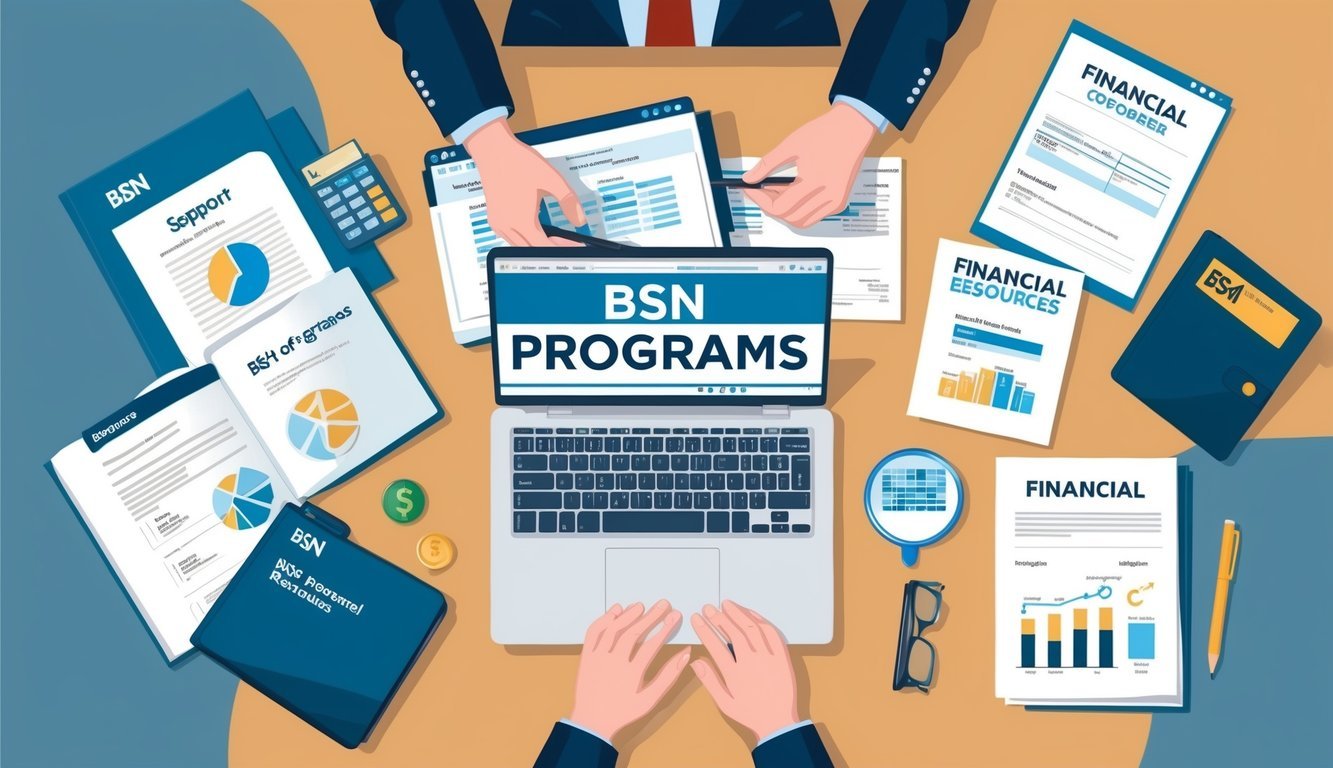Pursuing a Bachelor of Science in Nursing (BSN) degree is a significant step toward a successful career in healthcare.
Getting a BSN typically involves earning a high school diploma or GED, enrolling in an accredited four-year nursing program, and completing both classroom and clinical training.
This degree not only enhances your nursing education but also opens up better career opportunities and higher salary prospects compared to those with an associate degree in nursing (ADN).
As more healthcare facilities prefer nurses with a BSN, understanding the requirements and options available to you is crucial.
You can choose from several pathways to earn your BSN, including traditional four-year programs, accelerated programs for those with previous degrees, or RN-to-BSN programs for licensed nurses looking to advance their education.
Exploring these options will help you find the best fit for your career goals.
Investing in your education through a BSN program can lead to a more fulfilling nursing career.
The curriculum typically emphasizes nursing research, ethics, and informatics, preparing you for the complexities of modern healthcare environments.
Consider visiting resources like NurseJournal.org or Nurse.org to learn more about the specifics of BSN programs.
Understanding BSN Programs
BSN programs prepare you for a career as a registered nurse, equipping you with the necessary skills for clinical practice.
Various types exist to cater to different educational backgrounds, all with specific admission requirements.
Types of BSN Programs
There are several types of BSN programs available:
-
Traditional BSN Program: This four-year program is designed for high school graduates. It covers foundational nursing courses, clinical experience, and general education subjects.
-
Accelerated BSN Programs: These are intensive programs for individuals who already hold a bachelor’s degree in another field. They typically last 12-18 months and compress the curriculum into a shorter timeframe.
-
RN-to-BSN Programs: Designed for registered nurses with an Associate Degree in Nursing (ADN), these programs allow you to earn your BSN, often in a year or less. Many options are available, including Online RN-to-BSN Programs for added flexibility.
BSN Admission Requirements
BSN programs generally have similar admission requirements, including:
-
Educational Background: You typically need a high school diploma or equivalent. Prerequisite courses in subjects such as English, math, science, and social studies are often required.
-
GPA Requirements: Many programs seek students with a strong academic record, often requiring a minimum GPA.
-
Entrance Exams: Some programs may require an entrance exam, like the HESI or TEAS, to assess your readiness for nursing education.
-
Application Documents: You will need to submit transcripts, letters of recommendation, and a personal statement as part of the application process.
Comparing ADN and BSN
When choosing between an ADN and a BSN, consider the following differences:
| Factor | ADN | BSN |
|---|---|---|
| Duration | 2-3 years | 4 years |
| Career Opportunities | Entry-level positions | Broader opportunities |
| Salary Potential | Typically lower | Generally higher |
| Education Focus | Technical skills | Comprehensive nursing education |
A BSN provides deeper knowledge of nursing theory, leadership, and public health.
This can open doors for advanced practice roles and management positions in healthcare.
Curriculum and Clinical Training
The curriculum for a Bachelor of Science in Nursing (BSN) program is designed to provide you with a comprehensive understanding of nursing principles and hands-on clinical practice.
You will engage in core nursing classes, complete clinical rotations, and explore specialized nursing courses that enhance your skills and knowledge.
Core Nursing Classes
Your BSN curriculum will include a variety of core nursing classes essential for developing your foundational nursing skills.
Typical courses may include:
- Fundamentals of Nursing: Introduction to basic nursing care and skills.
- Pharmacology: Study of medications and their effects on patients.
- Health Assessment: Techniques for performing physical examinations and patient evaluations.
These courses emphasize evidence-based practice, critical thinking, and effective communication.
You will learn how to assess patient needs and deliver appropriate interventions, preparing you for real-world clinical situations.
Understanding these core subjects is pivotal for your success as a nurse.
Clinical Rotations and Hours
In addition to classroom learning, you will be required to complete a specified number of clinical hours.
These rotations occur in various healthcare settings, such as hospitals, clinics, and community health organizations.
Typically, you will need to complete 300-700 clinical hours as part of your program.
During these rotations, you will apply your classroom knowledge in practical settings, develop nursing skills, and learn to work collaboratively with healthcare teams.
Clinical experiences help you grasp the realities of patient care and enhance your critical thinking skills.
Specialized Nursing Courses
As you advance through your BSN program, specialized nursing courses become available.
Some examples include:
- Community Health Nursing: Focus on public health principles and community care strategies.
- Pediatric Nursing: Care principles for treating children and adolescents.
- Gerontological Nursing: Specialized care for the elderly population.
These courses deepen your understanding of various patient populations and healthcare environments.
By enrolling in specialized courses, you prepare yourself for a diverse range of nursing roles and improve your employability in a competitive field.
For more information about the BSN curriculum and courses, consider visiting NurseJournal.org or NursingProcess.org.
Licensing and Continuing Education
Achieving your Bachelor of Science in Nursing (BSN) is an essential step towards becoming a licensed registered nurse (RN).
This section addresses the key components of licensing, including preparing for the NCLEX-RN exam, understanding state licensure requirements, and exploring advanced degrees in nursing.
Preparing for the NCLEX-RN Exam
The NCLEX-RN exam is a crucial step in obtaining your nursing license.
It tests your knowledge and judgment in nursing practice based on the competencies expected of new RNs.
To prepare effectively, consider the following strategies:
- Study Resources: Utilize NCLEX review books and online courses tailored to the exam format.
- Practice Questions: Engage in practice exams to familiarize yourself with the test structure.
- Study Groups: Collaborate with peers to reinforce learning and tackle difficult concepts together.
Once you pass the NCLEX, you are eligible for RN licensure, allowing you to practice as a professional nurse.
State Licensure Requirements
State licensure requirements can vary significantly, so it’s vital to understand the specifics for your state.
Most states require you to fulfill the following:
- NCLEX-RN Exam: Passing the NCLEX-RN is mandatory to obtain your nursing license.
- Application Process: Submit an application to your specific state board of nursing, which may include background checks and verification of your education credentials.
- Continuing Education: Some states require ongoing education for license renewal, ensuring you stay current on new practices. For example, you might need 30 contact hours of continuing education every two years in California.
Consult your state board for precise requirements.
Advanced Degrees in Nursing
For those considering advanced nursing roles, pursuing a Master of Science in Nursing (MSN) or a Doctor of Nursing Practice (DNP) can open expanded career opportunities.
-
MSN Degree: This graduate program prepares you for roles such as nurse practitioner, clinical nurse leader, or nurse educator. Advanced practice roles often require additional certifications after earning an MSN.
-
DNP: Targeted at those seeking the highest level of clinical practice, the DNP helps you implement evidence-based practices and lead projects that improve healthcare outcomes.
Both degrees enhance your nursing qualifications and often require continuing education for maintenance, contributing to your professional development and licensure renewal.
Career Prospects and Advancements
Upon earning your BSN, you will open doors to diverse job opportunities, increased earning potential, and pathways into leadership roles.
Understanding these aspects can significantly enhance your nursing career and job satisfaction.
Job Opportunities and Settings
With a BSN, you can explore a variety of nursing positions across different healthcare settings.
Common job opportunities include:
- Registered Nurse (RN): Work in hospitals, clinics, or community health settings.
- Clinical Nurse Specialist: Focus on improving patient care in specialized areas.
- Nurse Educator: Teach future nurses in academic settings.
Healthcare organizations increasingly prefer BSN-prepared nurses, reflecting a push for a more educated workforce.
This demand opens avenues in both traditional and non-traditional settings, such as telemedicine, home health care, and public health.
Earning Potential and Salary Trends
Earning a BSN can lead to higher salaries compared to other nursing qualifications.
Here’s a comparison of median salaries in different roles:
| Nursing Position | Average Annual Salary |
|---|---|
| Registered Nurse (BSN) | $81,220 |
| Clinical Nurse Specialist | $111,353 |
| Nurse Educator | $83,000 |
| Medical and Health Services Manager | $104,830 |
The job outlook for BSN-educated nurses is robust, with the Bureau of Labor Statistics projecting consistent employment growth.
As you advance in your career, you may also pursue specialized certifications that can further increase your earning potential.
Leadership and Management Roles
A BSN prepares you for leadership and management roles within healthcare.
You can transition into positions such as:
- Nurse Manager: Oversee nursing staff and patient care protocols.
- Director of Nursing: Manage entire nursing departments and ensure quality care.
- Clinical Coordinator: Facilitate clinical operations within healthcare teams.
In these roles, your understanding of nursing ethics, policies, and professional standards is crucial.
Leadership positions often require strong communication skills and the ability to mentor junior staff, reinforcing the importance of continuous education and professional development.
Financial Considerations and Supports

Understanding the financial landscape when pursuing a Bachelor of Science in Nursing (BSN) is crucial.
There are various avenues for financial aid, including scholarships, grants, and loans, that can significantly lessen your educational expenses.
Navigating Financial Aid
Federal financial aid is key in funding your nursing education.
You should start by completing the FAFSA (Free Application for Federal Student Aid), which determines your eligibility for grants, work-study programs, and loans.
Types of Financial Aid:
| Aid Type | Description |
|---|---|
| Grants | Funded by the government; do not require repayment. |
| Work-Study | Part-time work opportunities to help pay for school. |
| Loans | Borrowed money that must be repaid with interest. |
Each option varies in terms of eligibility and repayment, so you should read through the details carefully.
Federal loans often have lower interest rates than private ones, making them a preferable choice for many students.
Scholarships and Grants
Scholarships and grants can greatly reduce your financial burden.
Scholarships are often awarded based on merit, while grants are usually based on financial need.
Explore the following opportunities:
- Nursing-Specific Scholarships: Many organizations offer scholarships exclusively for nursing students. You can check sites like the American Nurses Foundation and Nursing.org.
- State Grants: Most states offer financial aid programs for students attending school in-state. Look into these local resources during your search.
Applying for multiple scholarships can also increase your chances of receiving funding.
Budgeting for Nursing School
Creating a budget is essential for managing your finances effectively while in nursing school.
Start by listing your expected income from various sources, including financial aid and part-time work.
Key Expenses to Consider:
- Tuition and Fees: These typically make up the bulk of your costs.
- Books and Supplies: Nursing programs often require expensive textbooks and materials.
- Living Expenses: Rent, food, and transportation should also factor into your budget.
Consider using budgeting tools or apps to track your spending and stay on top of your financial commitments.
With careful planning, you can better navigate the costs associated with earning your BSN.

